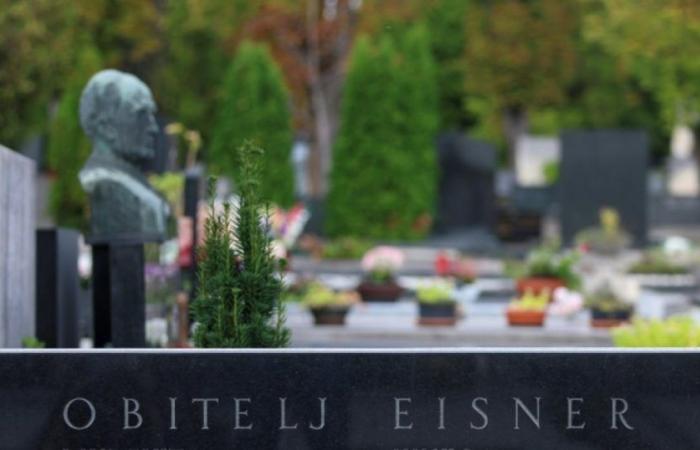A Star of David placed on one of the arcades of Zagreb’s largest cemetery indicates to visitors that they are entering the Jewish plot. But in its alleys, a good number of the deceased Jews are no longer there, replaced by Catholic tombs.
Under a law passed in the 1950s, abandoned concessions, for which no payments had been made for 10 years, were reallocated.
However, with the almost complete disappearance of the Jewish population during the Second World War, there was no longer anyone to take care of the graves and pay for their upkeep.
Several hundred thousand Jews, Serbs, Roma and anti-fascist Croats were persecuted and executed by Croatia’s pro-Nazi regime, the Ustashas, between 1941 and 1945. Nearly 80% of the approximately 25,000 Jews were killed .
This has led to the neglect and sometimes destruction since the end of the war of around 120 Jewish cemeteries across the country, notably that of Zagreb, Mirogoj, one of the most beautiful cemetery parks in Europe, known for its monumental architecture of the 19th century.
The first deceased buried in Mirogoj in November 1876 was, however, a Jew – Friedrich Miroslav Singer, a teacher renowned for having introduced sports lessons in Zagreb schools and having managed the first weight room in the Croatian capital.
“Even at the entrance to the Jewish part of Mirogoj, the graves are no longer Jewish,” the leader of the Jewish community of Croatia, Ognjen Kraus, told AFP. Result of a period of “devastation” during which the remains of more than 3,000 Jews were exhumed, adds Mr. Kraus.
– “Memorial heritage” –
Faced with this situation, the conservative government announced in September its intention to protect 52 Jewish cemeteries by classifying them as “memorial heritage”.
It’s a way to preserve them, Croatian Culture Minister Nina Obuljen Korzinek explains to AFP.
“As they were neglected and abandoned due to the persecution of the Jews during the Holocaust, we decided to protect them all together as a memorial heritage,” specifies the minister.
Fifteen other Jewish cemeteries already benefit from protection as “independent cultural sites”, as do some which have a Jewish plot, like Mirogoj.
According to the authorities’ project, prepared for years with representatives of the Jewish community, these cemeteries will be carefully maintained and gradually rebuilt and their presence indicated to the public, thanks to funding from the government and municipalities.
In recent years, the Croatian authorities have regularly been accused – including by the Jewish community – of not reacting to the return of symbols of the Ustasha regime and complacent discourse on this dark period of Croatian history.
– “The memory will disappear” –
Jews are few in number in today’s Croatia: around 410 in the 2021 census, 2,000 in reality according to the Jewish community, compared to 3.8 million inhabitants, 80% of whom are Catholics.
If the deterioration of cemeteries continues, “the memory of the Jews will disappear”, fears Mr. Kraus.
Historically, the Jewish community has nevertheless largely contributed to the development of several cities in the country on the architectural, scientific and artistic levels, thus making Zagreb “a city of Central Europe”.
“Jewish cemeteries are practically the last material witnesses of the existence of the Jewish community in Croatia,” underlines Srdjan Matic, a figure in the local Jewish community, who is participating in this cemetery restoration project and sees it as a major action.
“It’s also very important for us on the religious aspect,” he says. The Jewish religion does not allow the remains of a dead person to be moved.
Several experts also believe that the protection of cemeteries is crucial for the cultural identity of the nation. “The concept of Mirogoj as a multi-faith cemetery is part of the cultural heritage that absolutely must be protected,” says Alan Braun, lecturer in architecture at the University of Zagreb.






